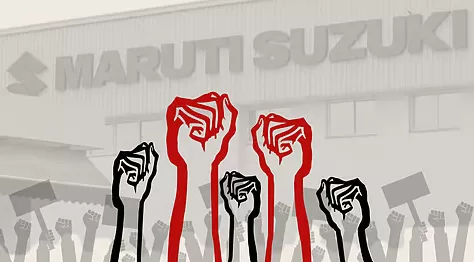A section of the former and current workers of Maruti Suzuki India Ltd. (MSIL) has been agitating against the carmaker’s alleged illegal and unethical labour practices for the last five months. Rallying under the aegis of the Maruti Suzuki Struggle Committee, the workers had been protesting peacefully in Haryana’s Manesar sitting on an indefinite dharna near Manesar DC office since September 18 last year, under the banner of their own collective titled Maruti Suzuki Struggle Committee (‘MSSC’). One of their main demands is equal pay for equal work.
Over the past twelve years, these workers have endured a prolonged legal, social, and financial struggle to cope with the hardships imposed on them and their families. A total of 546 permanent and 1,800 contract workers at Maruti Suzuki were dismissed, with several imprisoned for years, despite the company’s inability to prove their guilt in court.
This time around, agitating workers are demanding a 40 percent wage hike and equal rights for contract, temporary, casual workers, apprentices, student trainees, and trainees under the National Employability Enhancement Mission, who make up 77 percent of the workforce across Maruti Suzuki’s three plants in Haryana. Despite laws prohibiting the use of temporary or contract workers for permanent core production roles, the company has continued this practice for years, further violating the ‘equal pay for equal work’ principle.
Protesting under the banner of ‘Maruti Suzuki Asthayi Mazdoor Sangh,’ the workers demanded an end to the reliance on temporary workers for regular production across all company plants. They also called for equal pay for equal work, the regularisation of temporary employees, including those at the new Kharkhoda plant in Sonipat, and proper training for Maruti student trainees.
Equal Remuneration Act, 1976 provides for the payment of equal remuneration to men and women workers and for the prevention of discrimination, on the ground of sex, against women in the matter of employment and for matters connected therewith or incidental thereto. This basic objective of the 1976 Act has been retained in the newly enacted Code on Wages, 2019 where this particular feature is incorporated in subsections (1) and (2) under Section 3.
A similar explicit mention of the fact that equal wages be paid for equal work, irrespective of status of employment, would have made a very significant impact on the working of the Indian labour market. In that case, for similar kinds of work, wages would be the same for different types of workers, be it regular, contractual or casual. In that kind of scenario, there would be little incentive for employers to engage contract/casual workers in similar activities which is also being done by regular workers since wages that need to be paid would be statutorily same.
The basic reason behind engagement of contract/casual workers is that they are paid wages substantially lower than the wages paid to regular workers. Saving cost on wages is the primary reason why employers are engaging contract/casual workers. Overt use of contract/casual workers makes the labour market broadly informal.
The Supreme Court’s progressive decision on ‘Equal Pay for Equal Work’
In State of Punjab v. Jagjit Singh (2016), the Supreme Court held that the principle of “equal pay for equal work” is applicable to all temporarily engaged employees (daily-wage employees, ad-hoc appointees, employees appointed on casual basis, contractual employees and the like) who are entitled to minimum of the regular pay-scale, on account of them performing the same duties which are discharged by those engaged on regular basis against sanctioned posts.
The Supreme Court, in that case, further upheld that the principle of ‘equal pay for equal work’ has to be extended to those engaged in ad hoc or contractual work too. According to the Court, denying the same amounts to “exploitative enslavement”, and is “oppressive, suppressive and coercive.”
Subsequently, the Delhi High Court had also asked the Union government to file a status report on the implementation of the SC order by departments and ministries. The High Court had asked the Union government to file the status report on affidavit as to whether all government departments/Public Sector Undertakings/Corporations under the Union government including Central Warehousing Corporation are complying with the law declared by the Supreme Court.
After the Delhi High Court’s instructions, the Department of Personnel and Training (‘DoPT’), through its office memorandum of September 2019, had observed that if the nature of work entrusted to the casual workers and regular employees was the same, the casual workers might be paid at the rate of one-thirtieth of the pay at the minimum of the relevant pay scale along with the dearness allowance for work of eight hours a day.
The advisory further added:
“In cases where the work done by a casual worker is different from the work done by a regular employee, the casual worker may be paid only the minimum wages notified as per the Minimum Wages Act, 1948.”
The DoPT gave further instructions that people employed on a daily-rated casual basis should not be engaged for work of regular nature.
The Indian labour market has witnessed steady ‘informalisation’ over the years. There has been systematic mystification of employer-employee relations. The share of contract labour has continued to increase. The proportion of contract workers in organised manufacturing increased from 12 percent in 1990-91 to 33.6 percent in 2013-14. The share of contract workers’ wage out of total wage increased from 58.7 percent in 1999-2000 to 81.5 percent in 2013-14. The proportion of informal sector workers out of the total workforce is more than 90 percent.
Even though existing wage related labour laws and newly enacted Code on Wages 2019 do not explicitly incorporate the principle of ‘Equal Pay for Equal Work’, judicial pronouncements as cited above uphold this principle. Maruti Contract Workers are demanding something which is legally sound and feasible and can have a huge long-term repercussion on the working of the Indian labour market in general.
(Dr. Kingshuk Sarkar is a faculty at the Goa Institute of Management and former labour administrator at the Government of West Bengal. Courtesy: The Leaflet, an independent platform for cutting-edge, progressive, legal & political opinion, founded by Indira Jaising and Anand Grover.)




